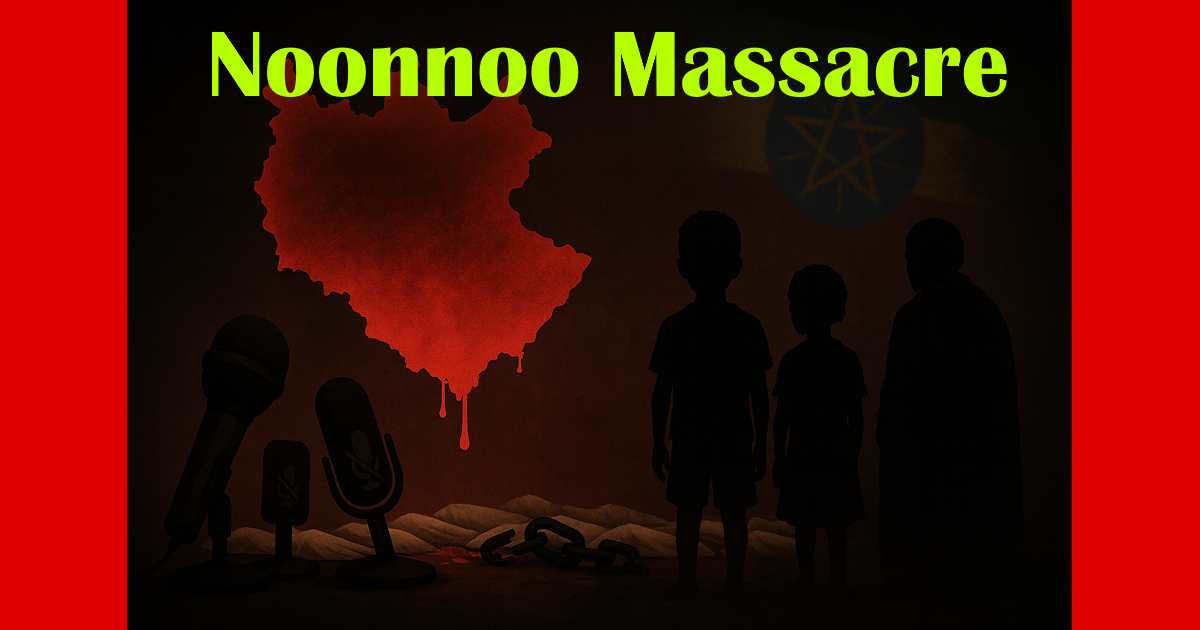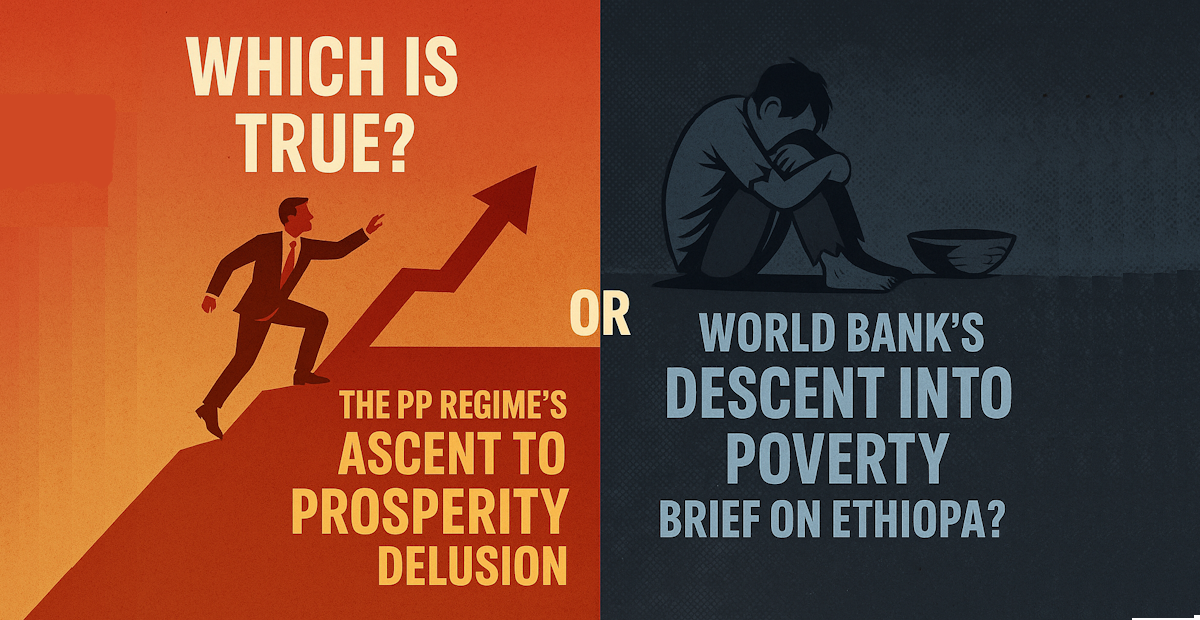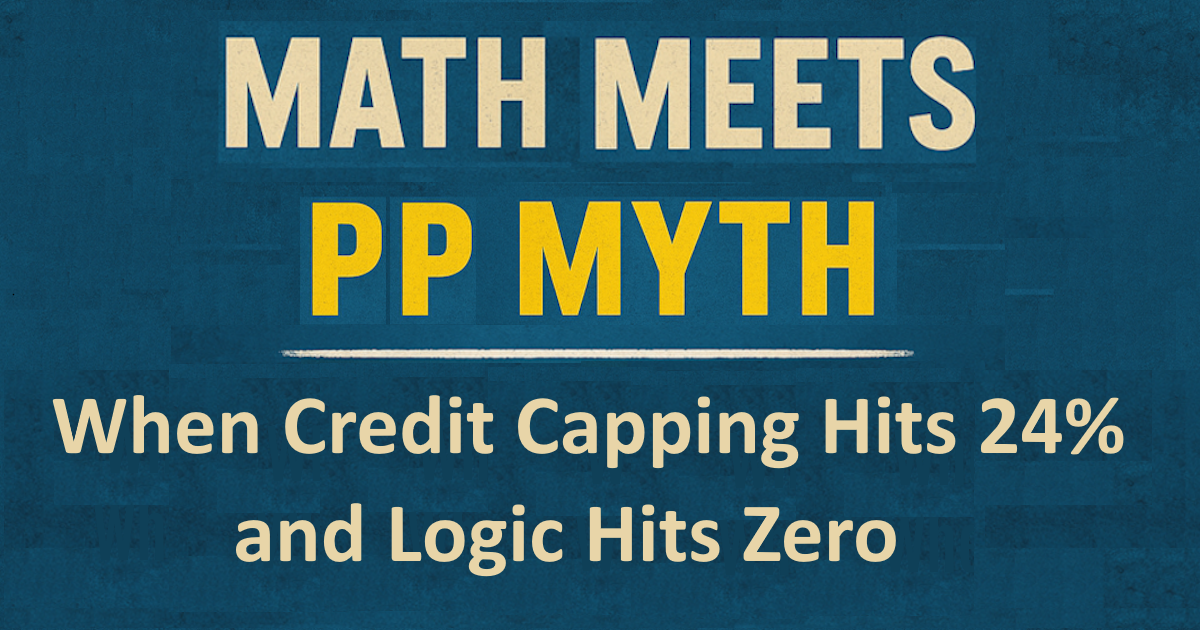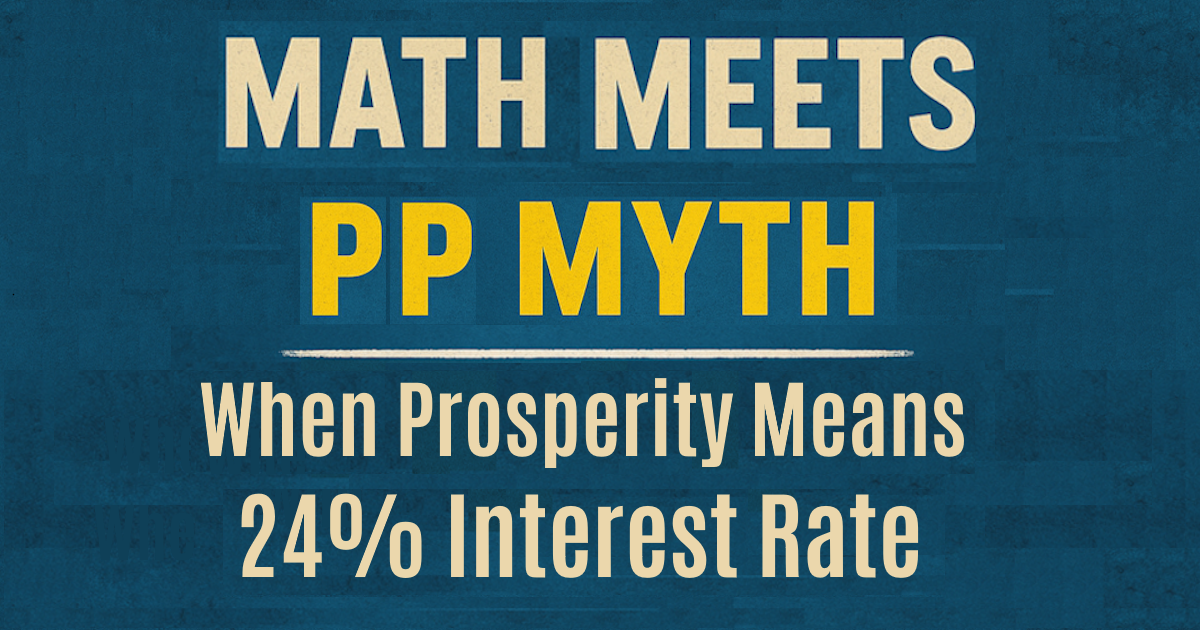The Gentleperson Code: Part II—When the Moral Compass Shatters
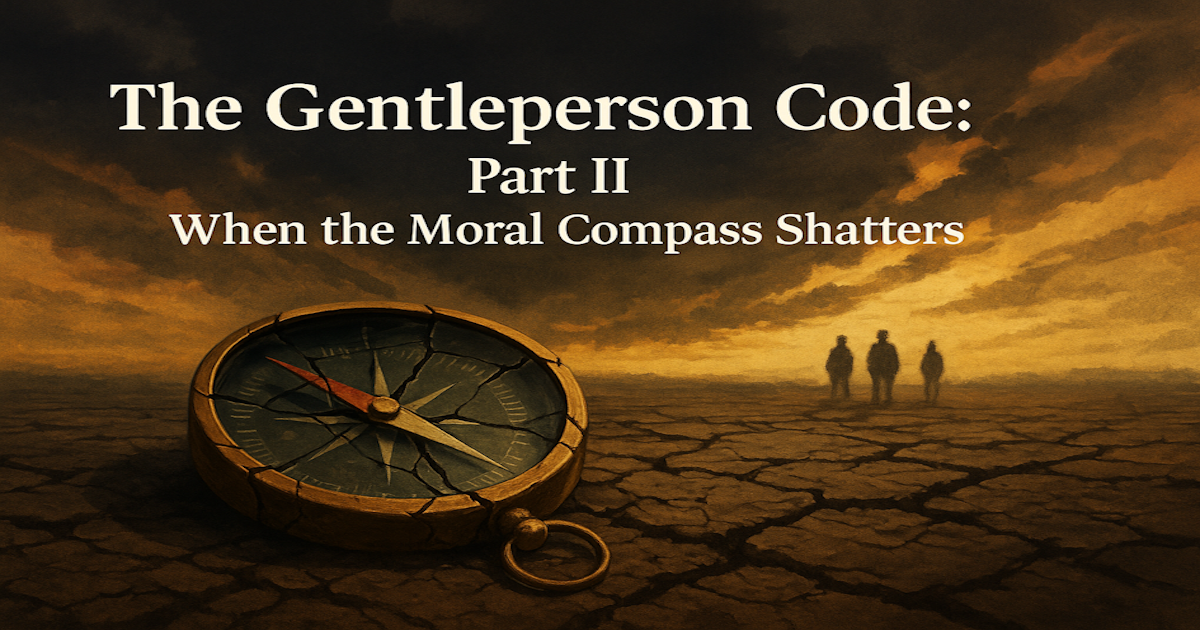
(contribution by invitation)
Excerpt
This is Part II of The Gentleperson Code, continuing from Part I—A Cross-Cultural Compass for Modern Dignity [1]. In this installment, we examine how leadership failures, social media, and shifting community values have shattered society’s moral compass. From the quiet erosion of ethical standards to the public normalization of corruption, this piece explores why moral clarity matters—and what’s at stake when it fades.
The Leadership Effect: When Theft Becomes Policy
In today’s hyperconnected world, leaders no longer merely shape policy—they shape societal morality. A word uttered at the top can travel faster and cut deeper than any legislation. It can either anchor a society in ethical clarity or untether it entirely from its moral foundations.
Take the infamous quip widely attributed to Ethiopia’s former Prime Minister Meles Zenawi:
“So long as you are not caught, even stealing is work.”
A line that might once have been dismissed as cynical banter suddenly took on chilling legitimacy when voiced by a head of state. Whether borrowed from U.S. populist Huey P. Long [2] or not, Meles’s utterance was no longer just commentary—it was doctrine. It legitimized corruption, turned theft into craft, and reframed wrongdoing as cleverness—as long as you stayed under the radar. Notably, reports suggest that theft-related crimes surged in Ethiopia soon after that irresponsible remark by Prime Minister Meles Zenawi.
Such a message sends dangerous ripples:
-
For bureaucrats, it rebrands embezzlement as “resourcefulness.”
-
For citizens, it corrodes trust in institutions.
-
For the youth, it signals that honesty is for fools, and cunning is king.
Fast forward to the current administration. In a recent bombshell interview, former State Minister of Peace Obbo Taye Danda’a Aredo revealed that Prime Minister Abiy Ahmed told thousands of his loyal cadres during a closed gathering:
“I know you are all stealing…You can steal, think how much… you can steal to educate your children.”
Let that sink in.
This isn’t silence in the face of corruption. This is authorization. This is the state’s highest office not just tolerating graft but curating it. Theft isn’t condemned—it’s quantified. Morality isn’t upheld—it’s budgeted. What then happens to anti-corruption campaigns, institutional reform, or the fragile trust of the public?
This is what we mean when we speak of normalizing the abnormal. It’s not the petty thief on the street who collapses a society—it’s when grand theft is repackaged as wisdom from the top.
The Global Echo: From Washington to Far Afield
But Ethiopia is far from alone. The global playbook for moral erosion has a new, emboldened chapter—penned in part by Donald J. Trump. A man who filed for bankruptcy six times, was impeached twice, and now bears 34 felony convictions, yet continues to command a political base and headlines.
In many countries, a single conviction is a career-ending scandal. A bankruptcy might disqualify someone from leading a local council, let alone a nation. Thankfully, in many mature democracies, such standards still hold. But when America, the self-proclaimed beacon of democracy, shrugs off these transgressions—when truth becomes “fake news,” and accountability becomes a partisan attack—it reverberates far beyond its borders.
African leaders have been quick to imitate. Journalists are dismissed with the same contempt as fake news. Critical voices are labeled enemies of progress. If the leader of the free world can undermine norms and thrive, why shouldn’t they?
And thus, a dangerous global precedent is set. The bar doesn’t just lower—it collapses.
The Social Media Impact: Normalizing the Abnormal
Here, the blame lies not with the technology itself, but with its misuse—be it social media or any other digital tool. If the leader’s megaphone sets the tone, social media builds the echo chamber. In a world where virality trumps virtue, the moral decay initiated by power figures is rapidly multiplied, meme-ified, and monetized—often without restraint, especially in societies like Ethiopia where age ratings, content moderation, and platform accountability are all but absent.
Social media does not merely amplify the leader’s message—it mutates it, wraps it in humor, cloaks it in irony, and delivers it as entertainment. A prime minister’s flippant endorsement of corruption becomes a TikTok soundbite. A scandal becomes a skit. Theft becomes a laugh line. And before long, the line between ridicule and reinforcement vanishes.
In such an environment:
-
Teenagers quote unethical leaders with admiration, not irony.
-
Children consume sexualized, violent, or deceptive content with no intervention—because no filter stands between them and the algorithm.
-
Clickbait creators flood the platforms with outrageous content not for insight, but for engagement metrics: likes, shares, ad revenue.
Moral ambiguity becomes a business model.
And unlike traditional media, which at least made a pretense of editorial oversight, social platforms are amoral by design. Their algorithms are indifferent to virtue. What matters is what grabs attention—and outrage, obscenity, or reckless “comedy” almost always win.
In Ethiopia, where smartphone access has leapt ahead of digital literacy and institutional safeguards, the damage is compounded:
-
Parents are often unaware of what their children are consuming—or are consuming the same content themselves.
-
Influencers, many of them unqualified and unaccountable, become de facto cultural educators.
-
Sensationalism drowns out substance. Fame outpaces credibility. And shallow performance replaces thoughtful discourse.
The consequences are profound. A society that laughs at its own erosion doesn’t just accept it—it begins to celebrate it. In this vacuum, indigenous moral compasses like Safuu struggle to compete. Respect, restraint, and self-regulation are pushed aside by trends, challenges, and short-form spectacles.
A Close Look at Community Level
Old age often grants us a vantage point—a panoramic view across generations. It allows one to reflect on how the moral codes that once defined community conduct have subtly but steadily shifted. Those who grew up among the gentlepersons of earlier decades—men and women of integrity, humility, and quiet honor—now find themselves in a world where such figures have become scarce, if not entirely obsolete.
One cannot help but ask: What happened?
How did we get from a time when social status was tied to character, to a time when it is measured almost exclusively by cash and visibility? The answer, at least in part, lies in how political leaders and cultural influencers have reshaped moral expectations, often unintentionally—sometimes deliberately. Instead of upholding virtue, many now validate vice, directly or through silence. The result is a community that increasingly celebrates corruption, cloaked in success, rather than condemning it.
Here are some lived observations:
- Money is God: The One to Worship:
Material wealth has eclipsed every other social metric. In the past, a person was respected for their wisdom, fairness, or service to others. Today, all eyes turn to the person with the biggest car, the tallest house, the most elaborate party. Money speaks—and speaks so loudly that it drowns out any questions about its origin. Whether earned, stolen, or inherited seems irrelevant. The implicit message is clear: You are as valuable as your net worth.
-
Everything Is Transactional:
The spirit of goodwill has withered. Where communities once thrived on neighborly cooperation and spontaneous acts of kindness, today’s ethos asks, “What’s in it for me?” Helping someone push a car, offering a ride, volunteering for community events—these were once instinctive, almost sacred. Now, many hesitate unless there’s compensation. Even emotional support is increasingly measured: Should I invest in this friendship? What will I gain? It’s a marketplace mentality infecting even the most intimate human interactions.
- Nobody Cares How You Got Your Wealth—Only That You Have It:
In times past, there was social stigma attached to ill-gotten gains. Someone known for corruption, theft, or unscrupulous business would be met with a cold shoulder—even if they were rich. Today, the inverse is true. Flashy success is applauded, no questions asked. Whether the wealth was siphoned from public funds, laundered through fake businesses, or amassed through exploitative means is often ignored. This attenuation of morality—where the end justifies the means—is one of the most damaging shifts in community values. It erodes accountability and offers tacit permission for the next generation to get rich by any means necessary.
- Even Sacred Norms Are Up for Sale:
What was once untouchable—almost canonical—is now being transgressed. The most alarming example is the bending of Gadaa system norms by a corrupt political class and compliant Abbaa Gadaas. A governance system that thrived independently for millennia is now being dragged into regime politics. Gadaa, by its nature, must remain sovereign—guided by its own rhythm, not the whims of state power. But corruption blurs judgment, and when Abbaa Gadaas become habituated to regime stipends, per diems, and hotel culture, they risk forgetting the very ethos they were entrusted to uphold. A deeper reflection on this erosion is warranted—and forthcoming.
- Yes, the Faarseebulaa Subculture:
Another manifestation of this moral decay can be seen in the rise of the Faarseebulaa subculture [4], marked by an alarming normalisation of public insolence. That one has the means to speak—and insult—does not mean one should. In a saner moral climate, even a modest sense of judgment would restrain such behaviour, especially in a digital age where the internet records every transgression for eternity. What was once unthinkable is now flaunted, as if impudence were a badge of honour rather than a symptom of cultural drift.
- Manifestation of The Dunning–Kruger effect:
This describes an emerging social ill on the social media whereby individuals pretend to be experts when they are not. Xibareebulaa, if you like. The rise of social media has democratised expression—but it has also flattened the hierarchy of knowledge. Platforms designed for connection have become theatres for performative expertise, where anyone with a smartphone and confidence can pose as an authority. This isn’t merely a communication issue; it’s a moral one. The ability to broadcast from a living room or bedroom has birthed a digital illusion of credibility, a cognitive bias where people with limited knowledge overestimate their competence. But in today’s attention economy, the problem runs deeper: clout increasingly overrides credibility, and visibility is mistaken for validity. From an Oromo moral perspective, this behaviour stands in sharp contrast to the principle of Safuu—the internal moral compass that governs speech, conduct, and social responsibility. In traditional Gadaa society, knowledge was not self-declared; it was earned, recognised, and granted by the community. To speak as an elder or authority without merit would have been unthinkable, even shameful. Yet today, we find self-appointed experts with no grounding in truth or responsibility, shaping opinions at scale. In this light, the erosion of Safuu through digital vanity becomes not just a cultural loss—but a civic hazard.
The cumulative effect of these trends is stark: communities once bound by mutual respect and shared moral anchors are now held together by envy, distrust, corruption, and opportunism. The trend has grown so complex—and at times so subtly corrosive—that in some scenarios, we were compelled to coin a new term, Amorelite, to describe this particular strain of moral decay [3].
Moral authority has shifted from the elder who lived a life of principle to the influencer who flaunts a life of indulgence with no moral scruples. Respect is bought, not earned. And in such an ecosystem, virtue becomes an outdated accessory.
But it’s not too late.
This close look at the community level is not just an obituary for the moral past—it is a diagnostic mirror. It reminds us that culture is not static. It evolves based on what we tolerate, celebrate, or remain silent about.
From Safuu to Safeguards
The slippery slope into pit-less moral descent, as described above, demands more than casual concern. It demands a cultural awakening—even a revolution of values—especially in societies like Oromia and Ethiopia, where moral decay has metastasized across public and private life.
For all their flaws and oppressiveness, past regimes—such as the Derg’s military dictatorship—maintained at least a relative moral order. Corruption existed, but it was cloaked, feared, and often punished. Public deception had its limits. A functional sense of shame prevailed. There was still something to fear—be it divine consequence, community disgrace, or legal reprimand. Today, those constraints have largely evaporated.
The deterioration began in earnest under the EPRDF era, when self-enrichment quietly infiltrated the state structure. But what was once discreet has now become audacious. In the last seven years under the Prosperity Party (PP), corruption has been not only normalized—but ritualized, dressed in political language, excused through populist spin, and in some cases, openly encouraged. As we’ve seen, when leaders proclaim “you can steal to educate your children,” the last moral barriers crumble. When theft is authorized at the top, impunity becomes the culture.
And the moral rot has not spread in silence. Social media has become its echo chamber, accelerating the decline. Satirical videos, remix culture, and algorithm-driven content have turned ethical red lines into punchlines. The once clear boundary between shame and showmanship has blurred into oblivion.
This is why cultural principles like Safuu—the Oromo moral compass—are not just symbolic relics. They are critical safeguards. Rooted in an ancient worldview of mutual respect, dignity, and internal accountability, Safuu operates before the law, beneath the law, and beyond the law. It governs what formal institutions often cannot: personal conduct, conscience, restraint, and honor.
It teaches that some things are not forbidden because they’re illegal—they’re illegal because they are first and foremost “unspeakable” by moral consensus.
The tragedy today is that such indigenous moral foundations are being ridiculed or rendered irrelevant by the very people who should uphold them. When the elite sneer at Safuu, when media mocks it, and when the youth grow up without ever hearing it invoked sincerely, the cultural backbone begins to fracture. And when that breaks, societies do not just bend—they eventually collapse.
This is why grassroots moral regeneration is not a luxury—it is a survival imperative. It begins not with policy, but with principles. Not with bureaucrats, but with moral custodians.
Community institutions—especially the Abbaa Gadaa system (thankfully a good majority are non corrupt!), moral elders, women’s councils, and youth forums—must step into this void. These are the structures that still carry the remnants of collective conscience. But they cannot act alone.
Regional and federal administrations must actively invest in moral infrastructure, just as they do in roads or schools. This means funding community-led ethics education, revitalizing traditional forums of accountability, and elevating cultural custodians to the same status as technocrats. It means weaving Safuu into school curricula, leadership training, and civic discourse—not as nostalgia, but as a living, breathing framework for repairing a fraying society.
Because when constitutions falter, when courts are compromised, and when leaders fall from grace, it is not legal systems that hold us together—it is moral systems.
And without Safuu, there may be little left to fall back on.
Replanting the Moral Seed: Before the Harvest Fails
There comes a time in every society’s journey when the soil must be tilled again. When the ground, long poisoned by lies, greed, and neglect, must be turned over—painfully, deliberately—to make way for something clean to grow. Ethiopia stands at such a threshold. So does Oromia.
What we’ve witnessed in recent decades is not merely a crisis of leadership, or a crisis of institutions. It is a crisis of conscience.
We have mistaken cunning for competence. We have confused visibility with virtue. We have celebrated the wealthy, even when we know the source of their wealth is rot. And perhaps most tragically, we have begun to laugh at things that should make us weep.
But all is not lost.
Every culture has within it the seeds of renewal—if we dare to plant them. Safuu is not dead. It is dormant. It waits for those who still whisper it in their hearts, who still feel that inward jolt when the line is crossed, who still pause before doing harm, not because they fear the law, but because they remember what it means to be human.
It is time to plant again.
Let us water the ground with truth. Let us clear the weeds of cynicism. Let us stop feeding the algorithm with our outrage, and start feeding our children with stories of integrity. Let us honor those who live quietly, justly, humbly—not just those who trend. Let elders become elders again. Let shame return where it belongs—not as a tool of repression, but as a mirror of self-awareness.
And let leaders be reminded: if they cannot be moral examples, they must at least get out of the way of those who are trying.
Because the harvest is coming. And if we do not replant the moral seed, we will reap only regret.
Epilogue
In the spirit of coining culturally grounded terms—following the likes of Amorelite [3] and Faarseebulaa [4] as introduced by OROMIA TODAY—this article proposes two new additions to the vocabulary of moral and intellectual critique, born from the patterns observed in this discourse.
Xibareebulaa: A term for individuals who pretend to be experts without actually possessing the knowledge or credentials. We see them everywhere—amplified by social media, emboldened by echo chambers. Naming them is the first step to calling out the masquerade. (See: The Manifestation of the Dunning–Kruger Effect.)
Fakkesseebulaa: The Xibareebulaa elevated—entrenched at the higher echelons of power and influence. This is the smooth-talking charlatan, adept at deception, skilled in projection, and applauded for being what he is not. Ethiopia, tragically, is not in short supply. Just look around.
References
- Olii Boran, The Gentleperson Code: Part I—A Cross-Cultural Compass for Modern Dignity, 7 July 2025, OROMIA TODAY.
- Home Page, Huey Long, The Man, His Mission & Legacy.
- Malkkaa Beenyaa, Amorelite: An Illuminating Word We Didn’t Know We Needed, 10 May 2025, OROMIA TODAY.
- Olii Boran and Ed Chapman, Digital Serfdom in Ethiopia: Faarseebulaa, Propaganda, and the Politics of Praise, 22 May, 2025, OROMIA TODAY.


